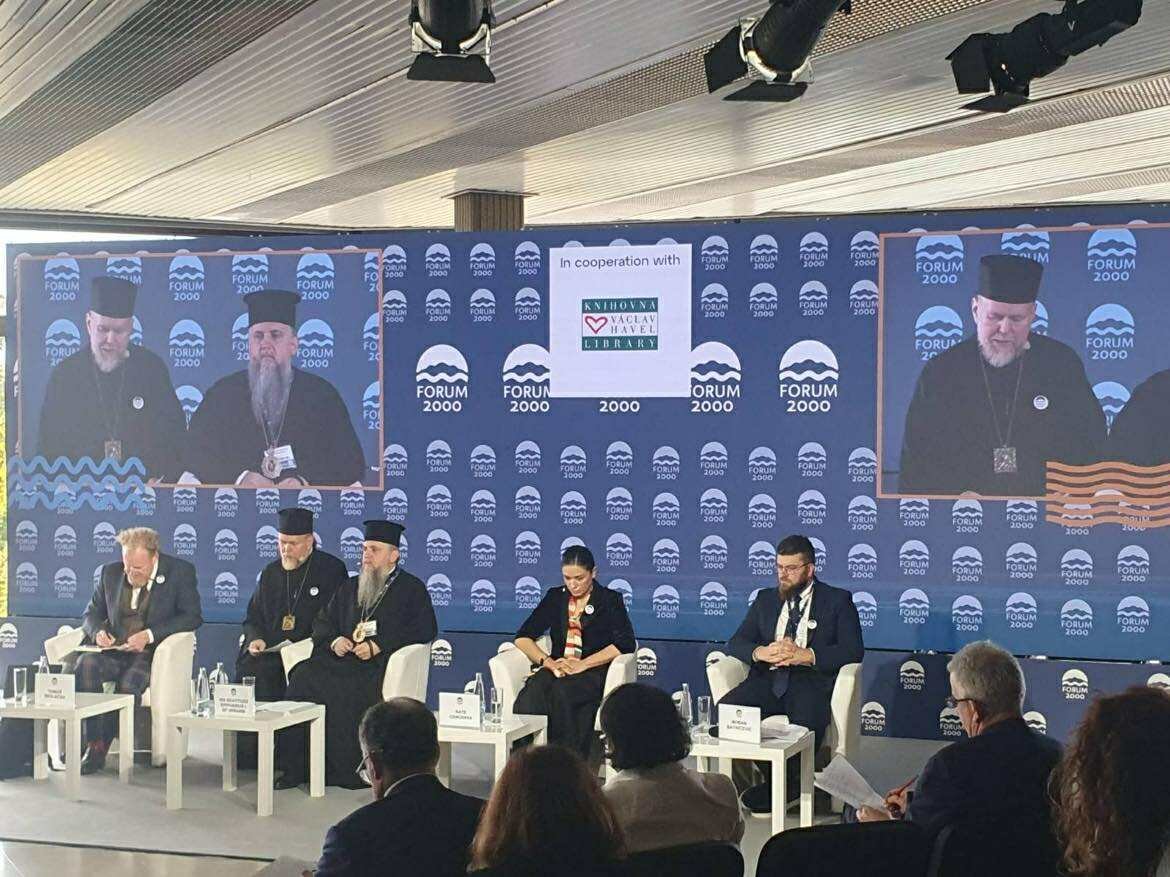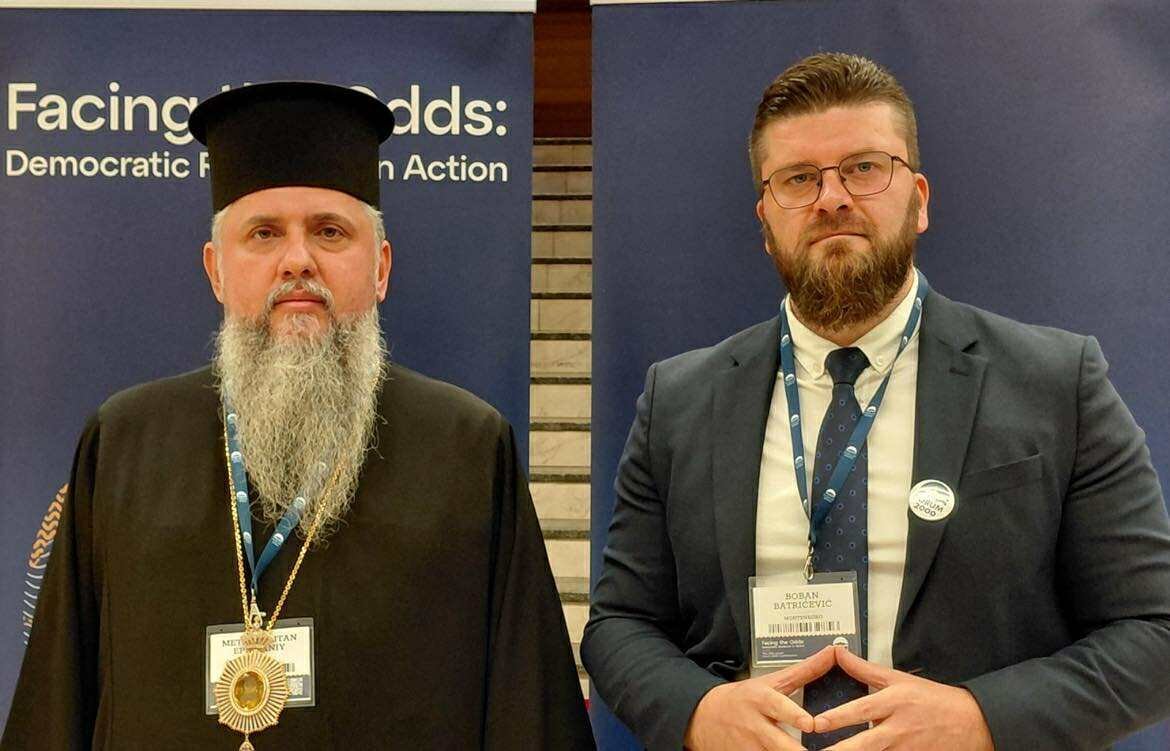Author: Antena M
At the international Forum 2000 conference, currently taking place in Prague, Boban Batrićević, Executive Director of WestBalkanNet and member of the International Coalition for Democratic Renewal (ICDR), participated in the panel “Religion and the Russian Threat, Yesterday and Today”, organized in cooperation with the Václav Havel Library.
The panel, held on Tuesday, October 14, at the Prague Congress Center, brought together prominent participants from Ukraine, Georgia, and Montenegro. It was moderated by Tomáš Sedláček, director of the Václav Havel Library. The speakers included His Beatitude Epiphanius I, Metropolitan of Kyiv and All Ukraine; Ketevan Chachava, Executive Director of the Center for Development and Democracy from Georgia; and Boban Batrićević from Montenegro.
In his presentation, Batrićević outlined an analysis of the role of the Serbian Orthodox Church in the hybrid activities of Russia and Serbia in the Western Balkans, with a particular focus on Montenegro.
“The Serbian Orthodox Church (SPC) is the primary instrument of cultural and identity transformation in Montenegro. It operates according to patterns and an agenda of hybrid action, with the ultimate goal of the long-term establishment of the Serbian factor in Montenegro, within which religious doctrine serves as a platform for: the normalization of the political pan-Serbian narrative; the delegitimization of Montenegrin history, language, culture, and statehood; spiritual colonization through mass performative forms, aggressive and mythologized iconography, and the introduction of the Church into public institutions.”
Batrićević reminded that after regaining independence in 2006, Montenegro became a battleground for competing Euro-Atlantic and authoritarian interests. He emphasized that “the strong influence of the Serbian Orthodox Church, together with dramatic social changes during the 1990s wars in the former Yugoslavia, contributed to a significant shift in the country’s national structure during that turbulent decade, despite the absence of major demographic changes.”

Speaking about Russian interference, Batrićević noted that “as soon as it became clear that Montenegro would join NATO, Russia activated all available tools to destabilize the country”, including the 2016 attempted coup involving then-opposition leaders Andrija Mandić and Milan Knežević.
„After the failed coup attempt in Montenegro, Russia shifted to a significantly softer model of operation, handing over coordination of the “takeover” of Montenegro to local Serb representatives, whom it financed either directly or through Serbia. The Russian-Serbian influence in Montenegro began to be exercised primarily through the Serbian Orthodox Church, which, with strong media and financial support from Serbian institutions, mobilized citizens during the 2020 parliamentary elections in Montenegro. In those elections, the parties that had attempted the 2016 coup came to power, and they currently govern Montenegro. Symbolically, to make it clear who holds power in Montenegro, the government formed in 2020 was established in a monastery controlled by the Serbian Orthodox Church.“
Explaining why the Montenegrin nation is a key target of long-term hegemonic projects, Batrićević emphasized:
„The Montenegrin nation represents the last obstacle to the “Serbian world” project in Montenegro and one of the main ones in the region—alongside the Bosniak nation in Bosnia and Herzegovina and the Albanian nation in Kosovo. Its existence threatens the ideological coherence of the Greater Serbia project, the hegemony of the Serbian Orthodox Church as the exclusive spiritual authority, Serbia’s political dominance, and the anti-European ideology in the Balkans.“
Batrićević concluded that Serbia’s multilayered influence in Montenegro is “of vital importance for Russian policy in the Balkans”, as Moscow “gains an indirect but effective lever for destabilizing the Western Balkans through the Serbian political, intelligence, cultural, and economic apparatus.”
„Relying on the religious infrastructure of the Serbian Orthodox Church, hybrid political actors, intelligence penetration, and criminal networks, Russia, through Serbia, is building a parallel authority in Montenegro, thereby slowing reforms, polarizing society, and compromising institutional integrity. The operative ideology of the “Serbian World”, whose core objective is the cultural, political, and identity unification of Serbian territories under Belgrade, fully reflects the model of the “Russian World”—a doctrine the Kremlin uses to justify its interventionist policies in the post-Soviet region.
Finally, Batrićević warned that Montenegro must be seen as an important security challenge for European institutions:
Montenegro should not be seen solely through the lens of its internal political problems, but as an active security challenge for European institutions—especially at a time when the EU enlargement process is gaining new momentum. Ignoring these tendencies enables the continuation of Russian and Serbian hybrid operations and undermines the very idea of European sovereignty and stability in Southeastern Europe.
After the panel, Batrićević met with the Ukrainian spiritual leader and took the opportunity to exchange views on the situation of Orthodoxy in Montenegro, expressing his wishes for Ukraine’s victory in the war against Russian imperialism, the statement concludes.









Komentari (0)
POŠALJI KOMENTAR